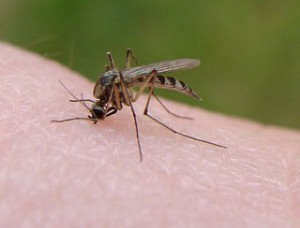A Cheaper Way to Stop Malaria?
Scientists are working on genetically altering bugs to eliminate the spread of diseases like malaria and the West Nile virus. A Pacific Standard article describes the research:
Some researchers, including the Australians and groups at Johns Hopkins University in Baltimore, are smuggling a hitchhiking bacteria into the dengue-carrying mosquitoes that prevents them from passing on the virus. A British team is tinkering with DNA to either significantly reduce the lifespan of malaria-carrying mosquitoes (known as Anopheles) or kill females when they are just embryos. Either method would cause a population crash. In James’s lab in Southern California, scientists are working on similar techniques.
What these methods all share is the promise of blanket protection: they can theoretically kill or disable mosquitoes that insecticides miss—bugs nesting in hidden pools of water, for instance, or that lay eggs in storm drains or flower pots. What’s more, bioengineering bugs is relatively cheap and doesn’t require toxic pesticides.


Comments